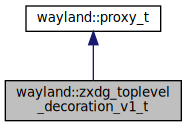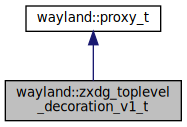decoration object for a toplevel surface More...
#include <wayland-client-protocol-unstable.hpp>


Public Types | |
| enum | wrapper_type { wrapper_type::standard, wrapper_type::display, wrapper_type::foreign, wrapper_type::proxy_wrapper } |
Public Member Functions | |
| void | set_mode (zxdg_toplevel_decoration_v1_mode mode) |
| set the decoration mode More... | |
| void | unset_mode () |
| unset the decoration mode More... | |
| std::function< void(zxdg_toplevel_decoration_v1_mode)> & | on_configure () |
| suggest a surface change More... | |
| uint32_t | get_id () const |
| Get the id of a proxy object. More... | |
| std::string | get_class () const |
| Get the interface name (class) of a proxy object. More... | |
| uint32_t | get_version () const |
| Get the protocol object version of a proxy object. More... | |
| wrapper_type | get_wrapper_type () const |
| Get the type of a proxy object. More... | |
| void | set_queue (event_queue_t queue) |
| Assign a proxy to an event queue. More... | |
| wl_proxy * | c_ptr () const |
| Get a pointer to the underlying C struct. More... | |
| bool | proxy_has_object () const |
| Check whether this wrapper actually wraps an object. More... | |
| operator bool () const | |
| Check whether this wrapper actually wraps an object. More... | |
| bool | operator== (const proxy_t &right) const |
| Check whether two wrappers refer to the same object. More... | |
| bool | operator!= (const proxy_t &right) const |
| Check whether two wrappers refer to different objects. More... | |
| void | proxy_release () |
| Release the wrapped object (if any), making this an empty wrapper. More... | |
Static Public Attributes | |
| static constexpr std::uint32_t | set_mode_since_version = 1 |
| Minimum protocol version required for the set_mode function. More... | |
| static constexpr std::uint32_t | unset_mode_since_version = 1 |
| Minimum protocol version required for the unset_mode function. More... | |
Detailed Description
decoration object for a toplevel surface
The decoration object allows the compositor to toggle server-side window decorations for a toplevel surface. The client can request to switch to another mode.
The xdg_toplevel_decoration object must be destroyed before its xdg_toplevel.
Definition at line 6320 of file wayland-client-protocol-unstable.hpp.
Member Enumeration Documentation
◆ wrapper_type
|
stronginherited |
Underlying wl_proxy type and properties of a proxy_t that affect construction, destruction, and event handling
| Enumerator | |
|---|---|
| standard | C pointer is a standard type compatible with wl_proxy*. Events are dispatched and it is destructed when the proxy_t is destructed. User data is set. |
| display | C pointer is a wl_display*. No events are dispatched, wl_display_disconnect is called when the proxy_t is destructed. User data is set. |
| foreign | C pointer is a standard type compatible with wl_proxy*, but another library owns it and it should not be touched in a way that could affect the operation of the other library. No events are dispatched, wl_proxy_destroy is not called when the proxy_t is destructed, user data is not touched. Consequently, there is no reference counting for the proxy_t. Lifetime of such wrappers should preferably be short to minimize the chance that the owning library decides to destroy the wl_proxy. |
| proxy_wrapper | C pointer is a wl_proxy* that was constructed with wl_proxy_create_wrapper. No events are dispatched, wl_proxy_wrapper_destroy is called when the proxy_t is destroyed. Reference counting is active. A reference to the proxy_t creating this proxy wrapper is held to extend its lifetime until after the proxy wrapper is destroyed. |
Definition at line 105 of file wayland-client.hpp.
Member Function Documentation
◆ c_ptr()
|
inherited |
Get a pointer to the underlying C struct.
- Returns
- The underlying wl_proxy wrapped by this proxy_t if it exists, otherwise an exception is thrown
◆ get_class()
|
inherited |
Get the interface name (class) of a proxy object.
- Returns
- The interface name of the object associated with the proxy
◆ get_id()
|
inherited |
◆ get_version()
|
inherited |
Get the protocol object version of a proxy object.
Gets the protocol object version of a proxy object, or 0 if the proxy was created with unversioned API.
A returned value of 0 means that no version information is available, so the caller must make safe assumptions about the object's real version.
display_t will always return version 0.
- Returns
- The protocol object version of the proxy or 0
◆ get_wrapper_type()
|
inlineinherited |
Get the type of a proxy object.
Definition at line 288 of file wayland-client.hpp.
◆ on_configure()
| std::function< void(zxdg_toplevel_decoration_v1_mode)> & zxdg_toplevel_decoration_v1_t::on_configure | ( | ) |
suggest a surface change
- Parameters
-
mode the decoration mode
The configure event asks the client to change its decoration mode. The configured state should not be applied immediately. Clients must send an ack_configure in response to this event. See xdg_surface.configure and xdg_surface.ack_configure for details.
A configure event can be sent at any time. The specified mode must be obeyed by the client.
Definition at line 8149 of file wayland-client-protocol-unstable.cpp.
◆ operator bool()
|
inherited |
Check whether this wrapper actually wraps an object.
- Returns
- true if there is an underlying object, false if this wrapper is empty
◆ operator!=()
|
inherited |
Check whether two wrappers refer to different objects.
◆ operator==()
|
inherited |
Check whether two wrappers refer to the same object.
◆ proxy_has_object()
|
inherited |
Check whether this wrapper actually wraps an object.
- Returns
- true if there is an underlying object, false if this wrapper is empty
◆ proxy_release()
|
inherited |
Release the wrapped object (if any), making this an empty wrapper.
Note that display_t instances cannot be released this way. Attempts to do so are ignored.
- Examples
- foreign_display.cpp.
◆ set_mode()
| void zxdg_toplevel_decoration_v1_t::set_mode | ( | zxdg_toplevel_decoration_v1_mode | mode | ) |
set the decoration mode
- Parameters
-
mode the decoration mode
Set the toplevel surface decoration mode. This informs the compositor that the client prefers the provided decoration mode.
After requesting a decoration mode, the compositor will respond by emitting a xdg_surface.configure event. The client should then update its content, drawing it without decorations if the received mode is server-side decorations. The client must also acknowledge the configure when committing the new content (see xdg_surface.ack_configure).
The compositor can decide not to use the client's mode and enforce a different mode instead.
Clients whose decoration mode depend on the xdg_toplevel state may send a set_mode request in response to a xdg_surface.configure event and wait for the next xdg_surface.configure event to prevent unwanted state. Such clients are responsible for preventing configure loops and must make sure not to send multiple successive set_mode requests with the same decoration mode.
Definition at line 8139 of file wayland-client-protocol-unstable.cpp.
◆ set_queue()
|
inherited |
Assign a proxy to an event queue.
- Parameters
-
queue The event queue that will handle this proxy
Assign proxy to event queue. Events coming from proxy will be queued in queue instead of the display's main queue.
See also: display_t::dispatch_queue().
- Examples
- proxy_wrapper.cpp.
◆ unset_mode()
| void zxdg_toplevel_decoration_v1_t::unset_mode | ( | ) |
unset the decoration mode
Unset the toplevel surface decoration mode. This informs the compositor that the client doesn't prefer a particular decoration mode.
This request has the same semantics as set_mode.
Definition at line 8144 of file wayland-client-protocol-unstable.cpp.
Member Data Documentation
◆ set_mode_since_version
|
staticconstexpr |
Minimum protocol version required for the set_mode function.
Definition at line 6370 of file wayland-client-protocol-unstable.hpp.
◆ unset_mode_since_version
|
staticconstexpr |
Minimum protocol version required for the unset_mode function.
Definition at line 6384 of file wayland-client-protocol-unstable.hpp.
The documentation for this class was generated from the following files:
